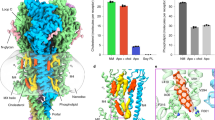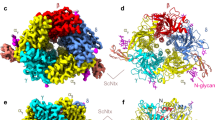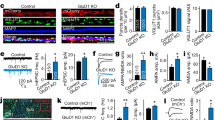Abstract
CONCANAVALIN A (con A), a tetrameric lectin which binds to specific carbohydrate residues1, has been used in the purification of a glutamate-binding glycoprotein isolated from rat brain synaptosomes2, and has been shown to alter the isotherm describing the binding of α-bungarotoxin to acetylcholine receptors on rat skeletal muscle3. Complementary electrophysiological studies on the effect of con A on intact receptor-bearing membranes are, as yet, lacking. We present here evidence that con A abolishes the desensitisation normally observed during repeated iontophoretic application of L-glutamate, the putative excitatory transmitter, to two populations of L-glutamate receptors on locust skeletal muscle fibres.
This is a preview of subscription content, access via your institution
Access options
Subscribe to this journal
Receive 51 print issues and online access
$199.00 per year
only $3.90 per issue
Buy this article
- Purchase on Springer Link
- Instant access to full article PDF
Prices may be subject to local taxes which are calculated during checkout
Similar content being viewed by others
References
Goldstein, J. J., Hollerman, C. E., and Smith, E. E., Biochemistry, 4, 876–883 (1965).
Michaelis, E. K., Biochem. biophys. Res. Commun., 65, 1004–1012 (1975).
Almon, R. R., and Appel, S. H., Fedn Proc., 34, 307 (1975).
Beránek, R., and Miller, P. L., J. exp. Biol., 49, 83–93 (1968).
Usherwood, P. N. R., and Machili, P., J. exp. Biol., 49, 341–361 (1968).
Usherwood, P. N. R., Nature, 411–412 (1969).
Cull-Candy, S. G., and Usherwood, P. N. R., Nature, 246, 62–64 (1973).
Usherwood, P. N. R., and Cull-Candy, S. G., Neuropharmacology, 13, 455–461 (1974).
Magazanik, L. G., and Vyskocil, F., J. Physiol. Lond., 249, 285–300 (1975).
Yahara, I., and Edelman, G. M., Proc. natn. Acad. Sci. U.S.A., 69, 608–612 (1972).
Edelman, G. M., Yahara, I., and Wang, J. L., Proc. natn. Acad. Sci. U.S.A., 70, 1442–1446 (1973).
Yahara, I., and Edelman, G. M., Proc. natn. Acad. Sci. U.S.A., 72, 1579–1583 (1975).
Yahara, I., and Edelman, G. M., Expl Cell Res., 91, 125–129 (1975).
Lea, T. J., and Usherwood, P. N. R., J. comp. Pharmac., 4, 337–350 (1973).
Katz, B., and Thesleff, S., J. Physiol., Lond., 138, 63–80 (1957).
Rang, H. P., and Ritter, J. M., Molec. Pharmac., 6, 357–382 (1971).
Magazanik, L. G., and Vyskocil, F., J. Physiol., Lond., 210, 507–518 (1970).
Lunt, G. G., Comp. gen. Pharmac., 4, 75–79 (1973).
Author information
Authors and Affiliations
Rights and permissions
About this article
Cite this article
MATHERS, D., USHERWOOD, P. Concanavalin A blocks desensitisation of glutamate receptors on insect muscle fibres. Nature 259, 409–411 (1976). https://doi.org/10.1038/259409a0
Received:
Accepted:
Issue Date:
DOI: https://doi.org/10.1038/259409a0
This article is cited by
-
Channel blocking drugs as tools to study glutamate receptors in insect muscles and molluscan neurons
Invertebrate Neuroscience (1997)
-
Intracellular application of polyamine and polyamine amide inhibits the quisqualate-sensitive ionotropic glutamate receptor of locust (Schistocerca gregaria) muscle
Invertebrate Neuroscience (1997)
-
Activation kinetics of Glutamate receptor channels from wild-type Drosophila muscle
Pflügers Archiv - European Journal of Physiology (1996)
-
Effects of concanavalin A on desensitization kinetics of GABA responses inAchatina fulica neurons
Cell Biology and Toxicology (1995)
-
Metabolic pathways of concanavalin action on chemical sensitivity at the neuronal membrane
Neurophysiology (1990)
Comments
By submitting a comment you agree to abide by our Terms and Community Guidelines. If you find something abusive or that does not comply with our terms or guidelines please flag it as inappropriate.



